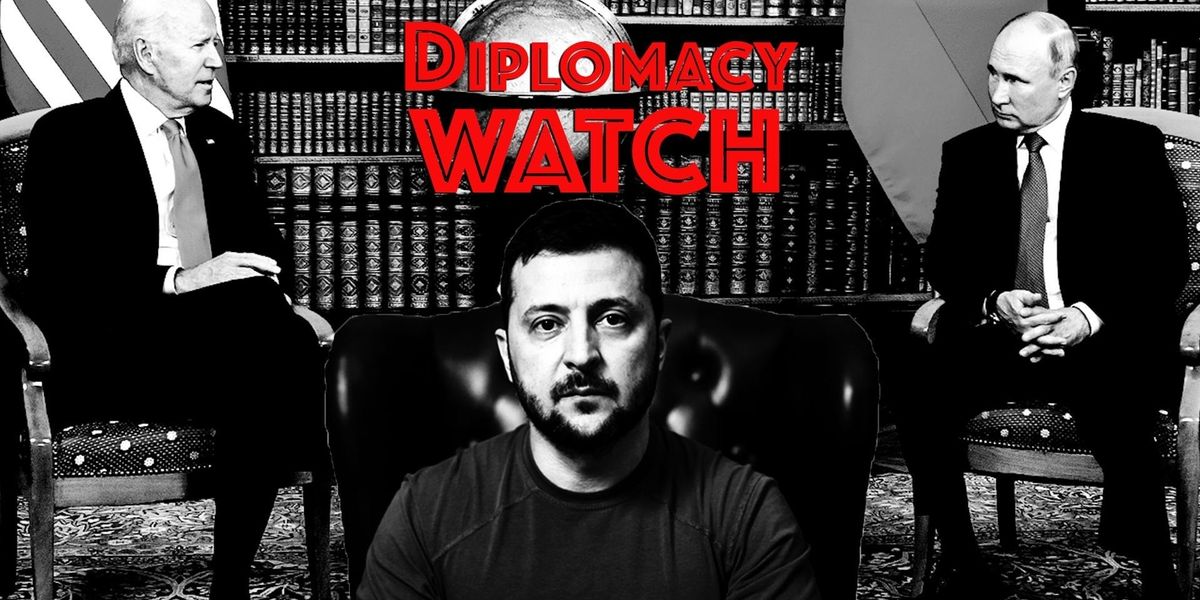During a major end-of-year press conference this week, Ukrainian President Volodymyr Zelensky said that talking about negotiations with Russia was “not relevant” at this time because Moscow has not yet shown any interest in ending the war.
Zelensky said that Ukraine would participate in a fourth round of talks with international security officials to discuss Kyiv’s ten-point peace plan at the World Economic Forum in Davos early next year.
“We will work to ensure that this meeting gathers representatives of all continents, including the Global South. The last five points of the Peace Formula will be worked out at this meeting,” Zelensky said during the news conference, held on Tuesday in Kyiv. “The first five points were considered by advisers at the previous meeting in Malta at the end of October.”
That meeting in Malta followed previous gatherings in Denmark and Saudi Arabia aimed at firming up support for Ukraine’s vision of a settlement from the international community. Representatives from many major nations have taken part, though Russia has yet to be invited to the meetings.
“According to Zelensky, after the fourth round Kyiv will work on organizing the first inaugural summit at the level of state leaders – the Global Peace Summit,” reported the Kyiv Post. “During the event, an agreement between the countries on the fundamental provisions, which will be embodied in the corresponding document, will be developed. After the document is adopted by all states, it can be transferred to the representatives of the Russian Federation.”
“If Russia is ready to accept that document, it will indicate that the issue of negotiations is relevant. Today it is not relevant. I don't see any request from Russia, I don't see it in their actions. I only see arrogance and murder in their rhetoric," Zelensky said.
During his remarks, the Ukrainian leader made a number of other notable remarks, including rejecting the assessment that his troops were losing the war, instead maintaining that Moscow had not accomplished any of its goals on the battlefield in 2023.
Zelensky struck an optimistic tone, insisting that the slow-moving aid packages from the United States and the European Union would eventually come through. ““We are working very hard on it,” he said regarding aid from Washington. “I am confident that the United States will not betray us and that everything we have agreed on with the U.S. will be fulfilled.”
The Ukrainian president also said that military advisors told him that Kyiv would need to mobilize approximately another 500,000 troops next year if it wants to successfully repel Russia’s invasion. Zelensky, however, did not commit to the mobilization, saying that the half a million figure was a “serious number” and that he would need to hear more arguments in favor of the move before making a decision.
As Connor Echols noted in last week’s edition of Diplomacy Watch, Russian President Vladimir Putin held his own major press conference earlier this month, in which he “played down his military’s middling performance and alleged that Western ‘freebies’ for Ukraine ‘are gradually running out.’”
This week, Putin claimed that he would be open to negotiations with Kyiv and its Western supporters, but offered no details and said that Moscow “will not give up what is ours."
In other diplomatic news related to the war in Ukraine:
— President Recep Tayyip Erdogan said that Turkey would be prepared to ratify Sweden’s bid for membership in NATO once the U.S. Congress agrees to the sale of F-16 fighter jets to Ankara. “Positive developments from the United States regarding the F-16 issue and Canada keeping its promises will accelerate our parliament’s positive view on [Sweden’s membership,]” Erdogan said. “All of these are linked.” Turkey has held up Sweden’s bid to join NATO for over a year.
—The U.S. Congress officially went home for the year this week without approving the emergency supplemental package that includes $61 billion in aid for Kyiv. The chances that the Senate would reach a compromise on the spending bill appeared slim in recent weeks, and despite some last-minute maneuvering, leadership eventually decided to punt on the legislation until next year. Punchbowl News published a timeline on Wednesday detailing how Washington — and the Republican Party in particular — has steadily grown skeptical on funding Ukraine in the nearly two years since Russia’s invasion.
—The Associated Press reports that the mood among Ukrainian forces has become increasingly gloomy this winter as they revert toward a more defensive position and as the lack of both manpower and firepower become more evident. “Despite a disappointing counteroffensive this summer and signs of wavering financial support from allies, Ukrainian soldiers say they remain fiercely determined to win,” the report reads. “But as winter approaches, they worry that Russia is better equipped for battle and are frustrated about being on the defensive again in a grueling war. Some doubt the judgment of their leaders.”
U.S. State Department news:
During a press briefing on Tuesday, State Department spokesperson Matthew Miller was asked if the administration had any “outside of the box” plans for funding Ukraine if Congress did not approve the aid package.
“There is no magic pot of funding that we have available to draw on if Congress doesn’t pass this bill. That’s not how government funding works. There is a – there are funding streams that we can draw on,” he said. “We have used those funding streams. We have nearly exhausted them, and over the next few weeks, we’ll fully exhaust them, and that’s why we need Congress to act.”
- Biden says Ukraine has already won. He's right. ›
- Zelensky: TIME may be on his side, but real time, isn't ›
- Diplomacy Watch: Zelensky's lonely calls for 10 point peace plan | Responsible Statecraft ›















